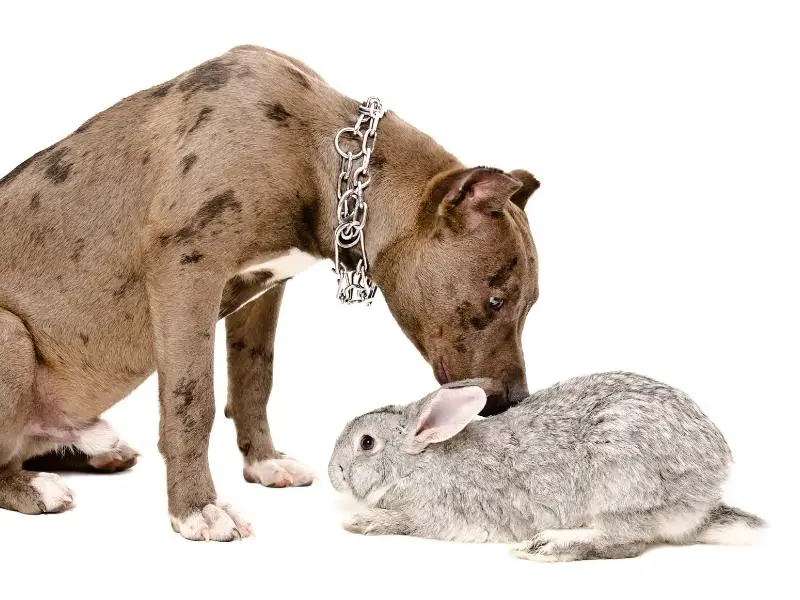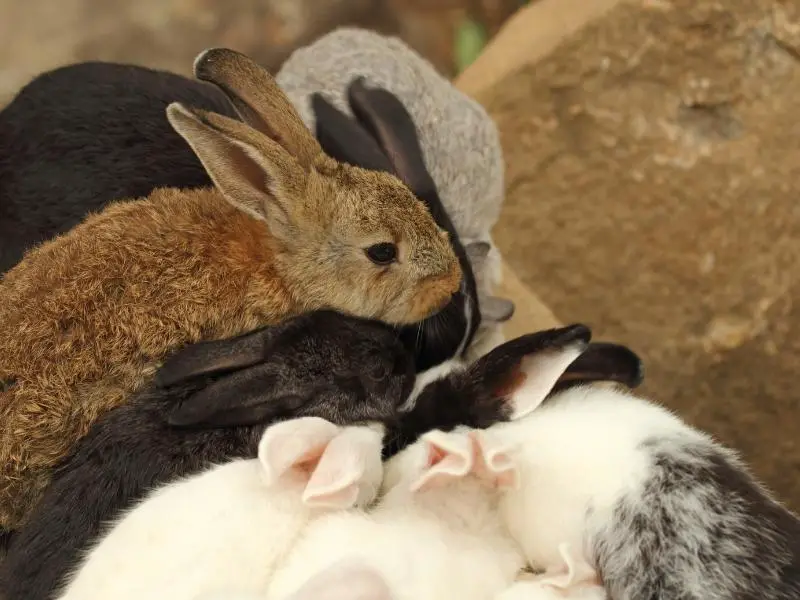Rabbits, like cats, like to clean themselves and live in clean hutches. In essence, these are not smelly pets, so if you are noticing a stink coming from your rabbit or its hutch, then something is wrong. But what, and is there anything you can do about it?
As clean animals, rabbits aren’t scentless but they don’t emit a foul odor. If your rabbit stinks, possible reasons include an unsanitary hutch or cage, a litter box that hasn’t been cleaned, rabbit urine that smells like ammonia, an unneutered rabbit during mating season, or a rabbit that’s sick.
Here are the reasons why your fluffy long-eared bestie may be smelling, how you can remedy the situation, and health concerns you should be on the lookout for.
Why Does My Rabbit Smell So Bad?
If you pick up an ungodly scent from your rabbit, chances are it isn’t the rabbit itself that smells bad.
Rabbits are fastidious in cleaning themselves and are not smelly pets by choice. If it is your bunny that is smelling bad, then you should check to see if there are signs of any wounds, infections, or illness, and contact your vet.
Reasons Why Your Rabbit Smells
There are various reasons why you are noticing a smell in the vicinity of your rabbit:
Sterilization
Male bunnies that have not been neutered sometimes emit a foul or musky smell that makes you wonder if a skunk entered your home. Ironically, this smell’s purpose is to attract a mate.
Feces
Your rabbit’s normal poop doesn’t smell, or rather, it isn’t a scent your nose can detect. This poop is round and has a hard texture.
Your bunny also produces another kind of poop, which is called cecotropes. This is mushy, grape-like poop is covered in a layer of mucous that your rabbit actually eats as it is excreted.
Cecotropes do have a smell, but you’ll only smell these if your rabbit is sick and hasn’t been eating its cecotropes or if it somehow produces too many. It can also be an indication that your rabbit’s diet isn’t well-balanced if you are seeing and smelling cecotropes.
You can give your rabbit fewer pellets and increase how much hay you provide.
Urine
With a high concentration of ammonia, your rabbit’s urine will become smelly.
It is generally more common for a male rabbit’s urine to be smellier than a female bunny’s pee; however, this very much depends on the individual rabbit.
Some rabbit owners report that their female rabbit’s urine smells while the male rabbit’s pee doesn’t have much of a smell.
Rabbits also sometimes spray urine when they want to claim or mark their territory. This is very smelly, and you’ll have quite the mess to clean up too.
Scent Glands
Rabbits have scent glands, which can be found next to their anus. These glands secrete a substance that is like tar and smells like a skunk.
Should your rabbit not clean their bottom properly, then your rabbit will have a bad smell as these glands get clogged.
How Do I Stop My Rabbit From Smelling?

There are a few ways you can stop bad smells coming from your rabbit’s cage or hutch:
Do Litter Training
To ensure your bunny doesn’t pee or poop where they aren’t supposed to and to make your life easier when it comes to cleaning up, litter training your rabbit will solve a few issues.
When Mr. and Ms. Fluffles do their business in one spot – aka a litter box – then the mess and smells are limited. Thus, you don’t need to clean the whole of your rabbit’s hutch as often.
Moreover, if your pet rabbits aren’t litter trained, then they will sit or sleep on soiled bedding. This results in their fur getting matted from the urine.
Or they could get pee scald, which is also called urine scald or hutch burn. This is when their urine soaks into the fur, and if not cleaned, it causes irritation because your rabbit’s skin is quite sensitive.
Pee scald can result in inflamed skin, hair loss, flystrike, or burn-like sores. If your rabbit has pee scald, then your bunny may smell.
Clean the Litter Box
Cleaning Ms. Fluffes’ litter box daily is a sure way to control the smell. Scoop out the waste every day.
Another benefit of regularly cleaning the litter box is that it ensures your rabbit continues using it. If the box is too dirty and smelly, then Mr. Fluffles may decide to do his business in another spot in his cage or hutch.
Get a Cover for the Litter Box
If your bunny’s urine smells particularly bad, then you can let your rabbit use a litter box that has a cover.
The cover will help contain the smell until you clean it out, but just because you can’t smell the urine, doesn’t mean you shouldn’t still regularly clean your rabbit’s litter box.
Also, make sure your bunny knows how to use the litter box or litter tray with the cover.
Neuter Your Buck and Spay Your Doe
Neutering your male rabbits is a solution to the skunk-like smell they emit when they want to mate.
This is a permanent solution to that smelly problem and it comes with the benefit that your bunny will live 2-3 years longer too. Plus, it is beneficial to their health.
Since bunnies, both males and females, sometimes pee everywhere in an attempt to claim territory, you can eliminate such behavior by getting your bunnies neutered or spayed.
Clean the Rabbit Hutch
Regularly cleaning the whole rabbit cage, pen, or hutch helps you manage bad smells. Not all hutches or metal cages are easy to clean, but cleaning every nook and cranny is important.
Ensure you choose rabbit-friendly cleaning products or make a homemade cleaning mix of equal parts water and vinegar. This helps you sanitize your rabbit’s house, and you can use this solution to clean up bunny messes too.
Clean the Scent Glands
To ensure the scent glands, which are located under your bunny’s chin and anus, don’t get clogged up, regularly clean these.
Choose the Right Bedding
Another way you can ensure your rabbit’s hutch doesn’t get smelly is by choosing the right bedding. Good options include hay on top of the newspaper, chemical-free hardwood stove pellets, and paper-based bedding.
With paper-based bedding, make sure you choose a product that is baking soda-free, as baking soda is harmful to rabbits. It can cause problems with their respiratory systems.
The same will happen if you opt for scented or deodorized litter.
Health Problems Can Make Your Rabbit Smell
If you ensure you clean the litter box daily to take care of the ammonia-smelling urine and your rabbits are neutered, then a healthy rabbit should not smell.
However, there are some health problems that can cause a smelly bunny:
Diarrhea
If your bunny’s poop is mushy or runny, then they are suffering from diarrhea. This is an indication of a serious health issue as diarrhea in rabbits isn’t common.
In this case, get your rabbit to the vet so they can see what is wrong and give your bunny the treatment it needs. As soon as your bunny poops normally, there won’t be a smell.
Obesity or Elderly, Disabled Rabbits
If your bunny suffers from obesity or it is either disabled or elderly, then it may not be able to clean itself as healthy rabbits do.
If your bunny suffers from arthritis or any other condition that limits movement, then your bun will find it painful and/or difficult to move to clean itself. Disabled rabbits will share the same difficulty.
There are a few ways you can help clean your rabbit.
One, spot clean. Use baby wipes that are hypoallergenic, alcohol, and fragrance-free. Rinse the wipes to get rid of that soapiness that comes with some wipes.
Wipe your rabbit to clean them and get rid of any mess that may be sticking to their fur. Then do a final wipe-down with a clean and rinsed wipe.
Two, dry baths. Sprinkle cornstarch on the areas of your bunny that need cleaning and work this into their fur and/or any messes.
As the cornstarch absorbs moisture, any debris will easily slide from the fur. You can also use a comb to help you loosen debris. Wipe your rabbit with a soft washcloth to remove excess cornstarch.
Three, butt baths. Fill a tub with 1-2 inches of water and add 1-2 tablespoons of rabbit-friendly shampoo. Gently lower your rabbit into the tub so the water covers their bottom.
Gently wash your bunny’s bottom until clean. Then, with running water, rinse off the soap, and gently pat your rabbit dry with a soft towel. Once thoroughly dry, comb out their fur and apply a skin protectant or ointment.
Other Health Issues
There are other health problems that can cause smelliness. These are urine scalding, urinary tract infections, and dental disease.
The Last Smell
A healthy rabbit will not smell bad, especially not if you have litter trained your bestie and keep the litter box clean.
Sniffing your rabbit daily will help you detect if there are any issues you should know about, and knowing means you can take appropriate action.
Your list of actions can include helping your obese rabbit clean itself, cleaning out clogged scent glands, or taking your rabbit to see the vet because they are ill.
Related Articles:

